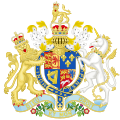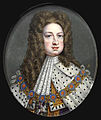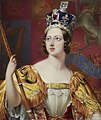House of Welf
| House of Welf (Guelf, Guelph) | |
|---|---|
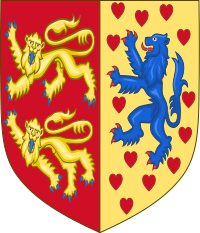 | |
| Parent house | House of Este (agnatic) Elder House of Welf (cognatic) |
| Country | Germany, Italy, United Kingdom of Great Britain and Ireland |
| Founded | 8th century |
| Founder | Welf I, Duke of Bavaria |
| Final ruler | Ernest Augustus, Duke of Brunswick |
| Titles |
|
| Estate(s) | Brunswick & Hanover |
| Deposition | 1918 (in Germany) |
| Cadet branches | House of Hanover |
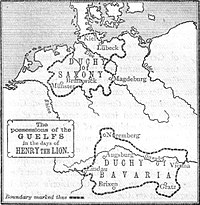
The House of Welf (also Guelf or Guelph[1]) is a European dynasty that has included many German and British monarchs from the 11th to 20th century and Emperor Ivan VI of Russia in the 18th century. The originally Franconian family from the Meuse-Moselle area was closely related to the imperial family of the Carolingians.
Origins
[edit]The (Younger) House of Welf is the older branch of the House of Este, a dynasty whose earliest known members lived in Veneto and Lombardy in the late 9th/early 10th century, sometimes called Welf-Este. The first member was Welf I, Duke of Bavaria, also known as Welf IV. He inherited the property of the Elder House of Welf when his maternal uncle Welf III, Duke of Carinthia and Verona, the last male Welf of the Elder House, died in 1055.
Welf IV was the son of Welf III's sister Kunigunde of Altdorf and her husband Albert Azzo II, Margrave of Milan. In 1070, Welf IV became Duke of Bavaria.
Welf II, Duke of Bavaria married Countess Matilda of Tuscany, who died childless and left him her possessions, including Tuscany, Ferrara, Modena, Mantua, and Reggio, which played a role in the Investiture Controversy. Since the Welf dynasty sided with the Pope in this controversy, partisans of the Pope came to be known in Italy as Guelphs (Guelfi).
The first genealogy of the Welfs is the Genealogia Welforum, composed shortly before 1126. A much more detailed history of the dynasty, the Historia Welforum, was composed around 1170. It is the earliest history of a noble house in Germany.
- Kunigunde of Altdorf, sister of Welf III, wife of Albert Azzo II of Este, Margrave of Milan, parents of Welf IV
- Welf I, Duke of Bavaria (c. 1030/1040 – 1101)
- Welf II, Duke of Bavaria (1073–1120)
Bavaria and Saxony
[edit]Henry IX, Duke of Bavaria, from 1120 to 1126, was the first of the three dukes of the Welf dynasty called Henry. His wife Wulfhild was the heiress of the house of Billung, possessing the territory around Lüneburg in Lower Saxony. Their son, Henry the Proud, was the son-in-law and heir of Lothair II, Holy Roman Emperor and became also Duke of Saxony on Lothair's death.
Lothair left his territory around Brunswick, inherited from his mother of the Brunonids, to his daughter Gertrud. Her husband Henry the Proud became then the favoured candidate in the imperial election against Conrad III of the Hohenstaufen. Henry lost the election, as the other princes feared his power and temperament, and was dispossessed of his duchies by Conrad III.
Henry's brother Welf VI (1115–1191), Margrave of Tuscany, later left his Swabian territories around Ravensburg, the original possessions of the Elder House of Welf, to his nephew Emperor Frederick I, and thus to the House of Hohenstaufen.
- Henry the Black, duke of Bavaria (1075–1126) and his wife Wulfhild of Billung
- Henry the Proud (1102–1139), Duke of Bavaria and Saxony, and his wife Gertrud of Saxony, daughter of Lothair II, Holy Roman Emperor, Duke of Saxony
- Welf VI (1115–1191), Margrave of Tuscany
- Steingaden Abbey, Swabia, place of burial of its founder Welf VI (d. 1191)
The next duke of the Welf dynasty Henry the Lion (1129/1131–1195) recovered his father's two duchies, Saxony in 1142, Bavaria in 1156 and thus ruled vast parts of Germany. In 1168 he married Matilda (1156–1189), the daughter of Henry II of England and Eleanor of Aquitaine, and sister of Richard I of England, gaining ever more influence. His first cousin, Frederick I, Holy Roman Emperor of the Hohenstaufen dynasty, tried to get along with him, but when Henry refused to assist him once more in an Italian war campaign, conflict became inevitable.
Dispossessed of his duchies after the Battle of Legnano in 1176 by Emperor Frederick I and the other princes of the German Empire eager to claim parts of his vast territories, he was exiled to the court of his father-in-law Henry II in Normandy in 1180. He returned to Germany three years later.
Henry made his peace with the Hohenstaufen Emperor in 1185 and returned to his much diminished lands around Brunswick without recovering his two duchies. Bavaria had been given to Otto I, Duke of Bavaria, and the Duchy of Saxony was divided between the Archbishop of Cologne, the House of Ascania and others. Henry died at Brunswick in 1195.
- Henry the Lion (1130–1195), Duke of Bavaria and Saxony
- Matilda Plantagenet (1156–1189), wife of Henry the Lion, sister of Richard I of England
- Henry's Dankwarderode Castle in Brunswick
- Henry's Brunswick Lion
- Otto IV, Holy Roman Emperor, son of Henry the Lion and Matilda of England
Brunswick and Hanover
[edit]Henry the Lion's son, Otto of Brunswick, was elected King of the Romans and crowned Holy Roman Emperor Otto IV after years of further conflicts with the Hohenstaufen emperors. He incurred the wrath of Pope Innocent III and was excommunicated in 1215. Otto was forced to abdicate the imperial throne by the Hohenstaufen Frederick II.[2] He was the only Welf to become Holy Roman Emperor.

Henry the Lion's grandson Otto the Child became duke of a part of Saxony in 1235, the new Duchy of Brunswick-Lüneburg, and died there in 1252. The duchy was divided several times during the High Middle Ages amongst various lines of the House of Welf. The subordinate states had the legal status of principalities within the duchy, which remained as an undivided imperial fief. Each state was generally named after the ruler's residence, e.g., the rulers of Brunswick-Wolfenbüttel originally lived in Wolfenbüttel.
Whenever a branch of the family died out in the male line, the territory was given to another line, as the duchy remained enfeoffed to the family as a whole rather than its individual members. All members of the House of Welf, male or female, bore the title Duke/Duchess of Brunswick-Lüneburg in addition to the style of the subordinate principality.[3] By 1705, the subordinate principalities had taken their final form as the Electorate of Hanover and the Principality of Brunswick-Wolfenbüttel, and these would become the Kingdom of Hanover and the Duchy of Brunswick after the Congress of Vienna in 1815.
Principality of Brunswick-Wolfenbüttel
[edit]In 1269 the Principality of Brunswick was formed following the first division of the Duchy of Brunswick-Lüneburg. In 1432, as a result of increasing tensions with the townsfolk of Brunswick, the Brunswick Line moved their residence to Wolfenbüttel Castle, thus the name Wolfenbüttel became the unofficial name of this principality. With Ivan VI of Russia the Brunswick line even had a short intermezzo on the Russian imperial throne in 1740. Not until 1754 was the residence moved back to Brunswick, into the new Brunswick Palace. In 1814 the principality became the Duchy of Brunswick, ruled by the senior branch of the House of Welf.
Principality of Calenberg – later Electorate of Brunswick-Lüneburg
[edit]
In 1432 the estates gained by the Principality of Brunswick-Wolfenbüttel between the Deister and Leine split away as the Principality of Calenberg. In 1495 it was expanded around Göttingen and in 1584 went back to the Wolfenbüttel Line. In 1634, as a result of inheritance distributions, it went to the House of Luneburg residing at Celle Castle. In 1635 it was given to George, younger brother of Prince Ernest II of Lüneburg, who chose Hanover as his residence.
New territory was added in 1665, and in 1705 the Principality of Luneburg was taken over by the Hanoverians. In 1692 Duke Ernest Augustus from the Calenberg-Hanover Line acquired the right to be a prince-elector of the Holy Roman Empire as the Prince-Elector of Brunswick-Lüneburg. Colloquially the Electorate was known as the Electorate of Hanover. In 1814 it was succeeded by the Kingdom of Hanover.
British succession
[edit]Religion-driven politics placed Ernest Augustus's wife Sophia of the Palatinate in the line of succession to the British crown by the Act of Settlement 1701, written to ensure a Protestant succession to the thrones of Scotland and England at a time when anti-Catholic sentiment ran high in much of Northern Europe and Great Britain. Sophia died shortly before her first cousin once removed, Anne, Queen of Great Britain, the last sovereign of the House of Stuart.
Sophia's son George I succeeded Queen Anne and formed a personal union from 1714 between the British crown and the Electorate of Hanover, which lasted until well after the end of the Napoleonic Wars more than a century later, through the dissolution of the Holy Roman Empire and the rise of a new successor kingdom. The British royal family became known as the House of Hanover.
- Coat of arms of the Hanoverian Kings of Great Britain (1714–1801)
- George I (1714–1727)
- George II (1727–1760)
- Frederick, Prince of Wales (b. 1707 d. 1751)
- George III (1760–1820)
- George IV (1820–1830)
- William IV (1830–1837)
- Victoria (1837–1901)
Kingdom of Hanover
[edit]The "Electorate of Hanover" (the core duchy) was enlarged with the addition of other lands and became the Kingdom of Hanover in 1814 at the Congress of Vienna. During the first half of the nineteenth century, the Kingdom was ruled as personal union by the British crown from its creation under George III of the United Kingdom, the last elector of Hanover until the death of William IV in 1837.
At that point, the crown of Hanover went to William's younger brother, Ernest Augustus, Duke of Cumberland and Teviotdale under the Salic law requiring the next male heir to inherit, whereas the British throne was inherited by an elder brother's only daughter, Queen Victoria. Her offspring belong to the House of Saxe-Coburg and Gotha: in 1917 the name was changed to the House of Windsor.
The Kingdom of Hanover was lost in 1866 by Ernest Augustus's son George V of Hanover, Austria's ally during the Austro-Prussian War, when it was annexed by Prussia after Austria's defeat and became the Prussian province of Hanover. The Welfs went into exile at Gmunden, Austria, where they built Cumberland Castle.
- Coat of arms of the kingdom of Hanover 1837
- King George V of Hanover
Brunswick succession
[edit]
The senior line of the dynasty had ruled the much smaller principality of Brunswick-Wolfenbüttel, created the sovereign Duchy of Brunswick in 1814. This line became extinct in 1884. Although the Duchy should have been inherited by the Duke of Cumberland, son of the last king of Hanover, Prussian suspicions of his loyalty led the duchy's throne to remain vacant until 1913, when the Duke of Cumberland's son, Ernst August, married the daughter of Kaiser Wilhelm II and was allowed to inherit it. His rule there was short-lived, as the monarchy came to an end following the First World War in 1918.
The Welf dynasty continues to exist. The last member sitting on a European throne was Frederica of Hanover, Queen of Greece († 1981), mother of Queen Sofia of Spain and King Constantine II of Greece. Frederica's brother Prince George William of Hanover married Princess Sophie of Greece and Denmark, sister of Prince Philip, Duke of Edinburgh. The House's head is Queen Frederica's nephew Ernst August, the third and present husband of Princess Caroline of Monaco.
- The Leine Palace in Hanover
- Herrenhausen Palace and Herrenhausen Gardens in Hanover
Rulers
[edit]House of Welf
[edit]Partitions under Welf rule
[edit]| County of Auxerre (866–888) Raised to: Kingdom of Upper Burgundy (888–1032) | County of Altdorf (820–1191) | ||||||||||
| Annexed to the Holy Roman Empire | County Palatine of the Rhine (1195–1214) | Lordship of Lüneburg (1126–1235) Raised to: Duchy of Brunswick-Lüneburg (1235–1269) | |||||||||
| Annexed to House of Wittelsbach | |||||||||||
| Principality of Brunswick (1269–1291) | Principality of Lüneburg (1st creation) (1269–1369) | ||||||||||
| Principality of Grubenhagen (1291–1596)[4] | Principality of Wolfenbüttel (1st creation) (1291–1292) | ||||||||||
| Principality of Göttingen (1291–1463) | |||||||||||
| Principality of Wolfenbüttel (2nd creation) (1344–1400) | Lüneburg under Ascanian rule (1373–1388) | ||||||||||
| Principality of Lüneburg (2nd creation) (1388–1705) | |||||||||||
| Principality of Calenberg (1st creation) (1432–1584) | Principality of Wolfenbüttel (3rd creation) (1409–1485) | ||||||||||
| Principality of Wolfenbüttel (4th creation) (1494–1807) | |||||||||||
| Principality of Calenberg (2nd creation) (1634–1692) Raised to Electorate of Hanover (1692–1866) | |||||||||||
| Annexed by France | |||||||||||
| Duchy of Brunswick (1813–1918) | |||||||||||
| Annexed by Prussia | |||||||||||
Table of rulers
[edit]| Ruler | Born | Reign | Ruling part | Consort | Death | Notes | |
|---|---|---|---|---|---|---|---|
| Elder House of Welf | |||||||
| Welf I (a) | c. 775 Son of Rothard of the Argengau | c. 800 – 3 October 825 | County of Altdorf | Hedwig of Bavaria four children | 3 October 825 aged 49-50 | Eponymous founder of the family. | |
| Conrad I the Elder | c. 800 Son of Welf I (a) and Hedwig of Bavaria | 3 October 825 – 864 | County of Altdorf | Adelaide of Tours three children | 864 aged 63-64 | ||
| Welf I (b) |  | c. 835 First son of Conrad I and Adelaide of Tours | 864 – 876 | County of Altdorf | Unknown at least one child | 876 aged 40-41 | Also Count at Linzgau, Alpgau and possibly Argengau. |
| Conrad II the Younger | c. 835 Second son of Conrad I and Adelaide of Tours | 864 – 876 | County of Auxerre | Waldrada of Worms one child | 876 aged 40-41 | ||
| Eticho |  | c. 850 Son of Welf I (b) | 876 – 911 | County of Altdorf | Egila three children | c. 911 | |
| Rudolf I | 859 Son of Conrad II and Waldrada of Worms | 876 – 25 October 911 | County of Auxerre (until 888) Kingdom of Upper Burgundy (from 888) | Guilla of Provence c. 880 four children | 25 October 911 aged 51-52 | First King of Burgundy, from 888. | |
| Henry I of the Golden Plough[5] |  | c. 880 Son of Eticho and Egila | 911 – 935 | County of Altdorf | Atha of Hohenwart three children | c. 935 aged 54-55 | |
| Rudolf II | c. 880 Son of Rudolf I and Guilla of Provence | 25 October 911 – 11 July 937 | Kingdom of Upper Burgundy | Bertha of Swabia 922 two children | 11 July 937 aged 56-57 | Also King of Italy (922–926). | |
| Rudolf I | c. 910 Son of Henry I and Atha of Hohenwart | 935 – 950 | County of Altdorf | Siburgis/Richlind at least one child | c. 950 aged 39-40 | ||
| Conrad III the Peaceful | 925 Son of Rudolf II and Bertha of Swabia | 11 July 937 – 19 October 993 | Kingdom of Upper Burgundy | Adelaide of Bellay one child Matilda of France 866 four children | 19 October 993 aged 67-68 | ||
| Rudolf II |  | c. 940 Son of Rudolf I and Siburgis/Richlind | 950 – 10 March 990 | County of Altdorf | Ita of Öhningen three children | 10 March c. 990 aged 49-50 | |
| Henry II[5] |  | c. 960 First son of Rudolf II and Ita of Öhningen | 990 – 15 November 1000 | County of Altdorf | Unmarried | 15 November 1000 | Left no descendants. He was succeeded by his brother. |
| Rudolf III the Pious |  | 970 Son of Conrad III and Matilda of France | 19 October 993 – 6 September 1032 | Kingdom of Upper Burgundy | Agiltrude (d.1011) no children Ermengarde of Burgundy 28 June 1011 no children | 6 September 1032 aged 61-62 | After his childless death, the Kingdom was inherited by his niece. |
| Welf II[5] |  | c. 960 Second son of Rudolf II and Ita of Öhningen | 15 November 1000 – 10 March 1030 | County of Altdorf | Imiza of Luxembourg 1017 two children | 10 March 1030 Bodman-Ludwigshafen aged 69-70 | |
| Welf III[5] |  | 1007 Son of Welf II and Imiza of Luxembourg | 10 March 1030 – 13 November 1055 | County of Altdorf | Unmarried | 13 November 1055 Bodman-Ludwigshafen aged 47-48 | Also Duke of Carinthia. By intercession of his aunt Richlind of Altdorf, he inherited the property of her late husband, Adalbert II, count of Ebersberg. Left no descendants, and his inheritance passed to his nephews, sons of his sister Kunigunde. |
| The Altdorf property, which had been donated by Welf III to the Weingarten Abbey, was transferred, by widow Imiza of Luxembourg, then its Abbess and also mother of the late count, to Welf IV, son of her daughter Kunigunda.[6] | |||||||
| Gisela |  | 11 November 990 Daughter of Herman II, Duke of Swabia and Gerberga of Burgundy | 6 September 1032 – 15 February 1043 | Kingdom of Upper Burgundy (Conradine dynasty) | Brun I, Count of Brunswick 1002 three children Ernest I, Duke of Swabia 1012 two children Conrad II, Holy Roman Emperor 1016 three children | 15 February 1043 Goslar aged 52 | Gisela was heiress of her maternal uncle, which lead to the annexation of the kingdom to the Holy Roman Empire. |
| Upper Burgundy annexed to the Holy Roman Empire | |||||||
| Younger House of Welf | |||||||
| Welf IV[5] | 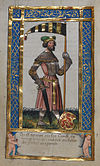 | c. 1035 Solesino (?) Son of Albert Azzo II, Margrave of Milan and Kunigunde of Altdorf | 13 November 1055 – 6 November 1101 | County of Altdorf | Ethelinde of Northeim 1062 no children Judith of Flanders 1071 three children | 6 November 1101 Paphos aged 65-66 | Son of Kunigunde of Altdorf and Albert Azzo II, Margrave of Milan, inherited his maternal family's possessions. Also Duke of Bavaria (1070–1077 and 1096–1101). |
| Welf V the Fat[5] |  | 1072 First son of Welf IV and Judith of Flanders | 6 November 1101 – 4 September 1120 | County of Altdorf | Matilda of Tuscany 1088/89 no children | 24 September 1120 aged 47-48 | Left no children, and the county went to his brother. Also Duke of Bavaria. |
| Henry III the Black[5] |  | 1075 Second son of Welf IV and Judith of Flanders | 4 September 1120 – 13 December 1126 | County of Altdorf | Wulfhilde of Saxony 1095 eight children | 13 December 1126 Ravensburg aged 50-51 | Inherited by marriage possessions in the Luneburg, to the north. |
| Henry IV the Proud[5] |  | 1108 Second son of Henry (III) and Wulfhilde of Saxony | 13 December 1126 – 20 October 1139 | Lordship of Lüneburg | Gertrude of Süpplingenburg 1202 one child | 20 October 1139 Quedlinburg aged 30-31 | Children of Henry the Black, Welf VI and Henry the Proud divided their inheritance: Welf VI kept the original possessions to the south, and Henry the northern ones, besides inheriting his father's title of Duke of Bavaria (1136–38), and conquering also the title of Duke of Saxony (1137–1139) inherited from their mother. Welf VI would also go on to become Margrave of Tuscany and Duke of Spoleto (1152–1160 and 1167–1173). In 1129, after Henry the Proud's defeat against Lothair III, Holy Roman Emperor, his sister Sophia was given a seat at Regensburg.[7] From c. 1150 until his death in 1167, Welf VI's son, Welf VII, was associated to his father, but predeceased him. After Welf VI's death, Altdorf was annexed to the Holy Roman Empire. |
| Welf VI the Mild[5] |  | 1115 Third son of Henry (III) and Wulfhilde of Saxony | 13 December 1126 – 15 December 1191 | County of Altdorf | Uta of Schauenburg c. 1130 two children | 15 December 1191 Memmingen aged 75-76 | |
| Welf VII[5] |  | 1135 Son of Welf VI and Uta of Schauenburg | c. 1150 – 12 September 1167 | Unmarried | 12 September 1167 Siena aged 31-32 | ||
| Sophia |  | 1105 Daughter of Henry (III) and Wulfhilde of Saxony | 1129 – 10 July 1145 | County of Altdorf (at Regensburg) | Berthold III, Duke of Zähringen c. 1120 no children Leopold, Margrave of Styria c. 1122 four children | 10 July 1145 aged 39-40 | |
| Regency of Gertrude of Süpplingenburg (1139–1142) | Inherited Brunswick from his mother after her death in 1143. Also Duke of Saxony (1142–1180) and Duke of Bavaria (1156–1180). When Frederick I, Holy Roman Emperor, became king of Germany, he restored Bavaria to the Welf line. | ||||||
| Henry V the Lion[5] |  | 1129 Ravensburg Son of Henry (I) and Gertrude of Süpplingenburg | 20 October 1139 – 6 August 1195 | Lordship of Lüneburg | Clementia of Zähringen 1147 three children Matilda of England 1168 five children | 6 August 1195 Braunschweig aged 65-66 | |
| Henry (V) the Elder[8] |  | 1173 First son of Henry (II) and Matilda of England | 6 August 1195 – 1212 | County Palatine of the Rhine (also at Stade and Altencelle, in Lüneburg) | Agnes of Hohenstaufen 1193 three children Agnes of Landsberg 1209 no children | 28 April 1227 Braunschweig aged 53-54 | Inherited the land jointly until 1213, when after William's death, they resigned this possessions in favor that William's son, the inheritor of the Luneburg property. Henry was Count Palatine of the Rhine (1195–1213), and Otto was Holy Roman Emperor (1212–1218). Henry also inherited, after William's death, extensive properties near the Elbe and the Weser. |
| Otto |  | 1175 Third son of Henry (II) and Matilda of England | 6 August 1195 – 19 May 1218 | Lordship of Lüneburg (at Haldensleben) | Beatrice of Swabia 1212 no children Maria of Brabant 19 May 1214 Maastricht no children | 19 May 1218 Harzburg aged 42-43 | |
| William Longsword |  | 11 April 1184 Winchester Fourth son of Henry (II) and Matilda of England | 6 August 1195 – 12 December 1213 | Lordship of Lüneburg | Helena of Denmark 1202 Hamburg one child | 12 December 1213 Lüneburg aged 29 | |
| Haldensleben re-merged in Lüneburg | |||||||
| Henry (VI) the Younger[9] | 1196 Son of Henry (III) and Agnes of Hohenstaufen | 1212 – 26 April 1214 | County Palatine of the Rhine | Unmarried | 26 April 1214 aged 17-18 | After his death the Palatinate was inherited by his sister. | |
| Regency of Otto IV, Holy Roman Emperor (1213–1218) | He was raised to Duke and recognised as such in 1235, by Frederick II, Holy Roman Emperor | ||||||
| Otto I the Child[10] |  | 1204 Son of William and Helena of Denmark | 12 December 1213 – 9 June 1252 | Duchy of Brunswick-Lüneburg | Matilda of Brandenburg 1228 ten children | 9 June 1252 Lüneburg aged 47-48 | |
| Agnes |  | 1201 Daughter of Henry (III) and Agnes of Hohenstaufen | 26 April 1214 – 1267 | County Palatine of the Rhine | Otto IV, Duke of Bavaria 1222 Worms five children | 1267 aged 65-66 | Her marriage with Otto, Duke of Bavaria determined the annexation of the county to the patrimony of the House of Wittelsbach. |
| County Palatine of the Rhine was inherited by the House of Wittelsbach | |||||||
| Albert I the Tall |  | 1236 First son of Otto I and Matilda of Brandenburg | 9 June 1252 – 15 August 1279 | Principality of Brunswick (until 1269 co-ruling in Brunswick-Lüneburg) | Elisabeth of Brabant 1254 no children Alexia of Montferrat 1263 seven children | 15 August 1279 Braunschweig aged 42-43 | Children of Otto I, they shared rule of the land until 1269. Albert became Prince of Brunswick and John a Prince of Luneburg. |
| John | 1242 Second son of Otto I and Matilda of Brandenburg | 9 June 1252 – 13 December 1277 | Principality of Lüneburg (until 1269 co-ruling in Brunswick-Lüneburg) | Liutgard of Holstein-Itzehoe 1265 five children | 13 December 1277 Braunschweig aged 34-35 | ||
| All Welf lines continued to bear the title "Duke of Brunswick-Lüneburg" between the division of 1269 and the end of the Holy Roman Empire in 1806. This was an additional title to the representation of their actual territorial lordship. However, as this is a list of rulers, the list goes beyond the use of the title, going through all generations until the end of the noble family representation in the land, in 1918. | |||||||
| Regency of Albert I, Duke of Brunswick-Lüneburg (1277–1279) Regency of Conrad of Brunswick-Lüneburg, Prince-Bishop of Verden (1277–1282) | His rule was marked by several feuds, financed by pledges (Verpfändungen), involving border and property disputes with his neighbours. Otto restricted the rights of the knights and safeguarded public order. | ||||||
| Otto II the Strict |  | 1266 Son of John and Liutgard of Holstein-Itzehoe | 13 December 1277 – 10 April 1330 | Principality of Lüneburg | Matilda of Bavaria 1288 five children | 10 April 1330 aged 63-64 | |
| Henry I the Admirable | August 1267 First son of Albert I and Alexia of Montferrat | 15 August 1279 – 7 September 1322 | Principality of Grubenhagen (until 1291 co-ruling at Brunswick) | Agnes of Meissen 1282 sixteen children | 7 September 1322 Einbeck aged 55 | Children of Albert I, ruled jointly. In 1291 divided the land: Henry received Grubenhagen, William Wolfenbüttel and Albert Göttingen. William died without descendants, and Albert reunited his land with his brother's. Wolfenbüttel became part of Göttingen. | |
| Albert II the Fat | 1268 Second son of Albert I and Alexia of Montferrat | 15 August 1279 – 22 September 1318 | Principality of Göttingen (until 1291 co-ruling at Brunswick) | Rixa of Werle 1284 ten children | 22 September 1318 aged 49-50 | ||
| William I | 1270 Third son of Albert I and Alexia of Montferrat | 15 August 1279 – 30 September 1292 | Principality of Wolfenbüttel (until 1291 co-ruling at Brunswick) | Elisabeth of Hesse 190 no children | 30 September 1292 Braunschweig aged 21-22 | ||
| Wolfenbüttel briefly annexed to Göttingen | |||||||
| Otto (I) the Mild | 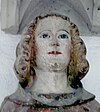 | 24 June 1292 First son of Albert II and Rixa of Werle | 22 September 1318 – 30 August 1344 | Principality of Göttingen | Judith of Hesse 1311 no children Agnes of Brandenburg-Salzwedel 1319 no children | 30 August 1344 Göttingen aged 52 | By marriage inherited the Altmark region, which he sold c.1340. Left no descendants. His inheritance went to his brothers. |
| Henry II of Greece | c.1295 First son of Henry I and Agnes of Meissen | 7 September 1322 – 1351 | Principality of Grubenhagen | Jutta of Brandenburg-Stendal 1318 four children Helvis of Ibelin 1324 six children | c.1355 Grubenhagen aged 59-60 | Sons of Henry I, ruled jointly. | |
| John I | c.1295 Second son of Henry I and Agnes of Meissen | 7 September 1322 – 1325 | Unmarried | c.1370 Einbeck aged 59-60 | |||
| Ernest I | 1297 Third son of Henry I and Agnes of Meissen | 7 September 1322 – 9 March 1361 | Adelheid of Everstein-Polle June 1335 nine children | 9 March 1361 aged 63-64 | |||
| William | 1298 Fourth son of Henry I and Agnes of Meissen | 7 September 1322 – 1360 | Unmarried | 1360 aged 61-62 | |||
| Otto III | 1296 Second son of Otto II and Matilda of Bavaria | 10 April 1330 – 19 August 1352 | Principality of Lüneburg | Matilda of Mecklenburg 1311 three children | 19 August 1352 aged 55-56 | Sons of Otto II, ruled jointly. After Otto's death in 1352, William ruled alone. His death without descendants precipitated the Lüneburg War of Succession in 1370. | |
| William II the Elder | 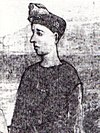 | c. 1300 Fourth son of Otto II and Matilda of Bavaria | 10 April 1330 – 23 November 1369 | Hedwig of Ravensberg 7 April 1328 one child Maria After 1387 one child Sophia of Anhalt-Bernburg 12 March 1346 no children Agnes of Saxe-Lauenburg 1363 no children | 23 November 1369 Lüneburg aged 68-69 | ||
| Magnus I the Pious | 1304 Seventh son of Albert II and Rixa of Werle | 30 August 1344 – 1369 | Principality of Wolfenbüttel | Sophia of Brandenburg-Stendal 1327 eight children | 1369 aged 64-65 | Younger brothers of Otto, divided the inheritance. | |
| Ernest I | 1305 Eighth son of Albert II and Rixa of Werle | 30 August 1344 – 24 April 1367 | Principality of Göttingen | Elisabeth of Hesse 1337 three children | 24 April 1367 aged 61-62 | ||
| Albert I | c. 1339 First son of Ernest I and Adelaide of Eberstein-Polle | 9 March 1361 – 1383 | Principality of Grubenhagen | Agnes of Brunswick-Lüneburg 1371 one child | 1383 aged 43-44 | Children of Ernest I, divided their inheritance. John II abdicated 1364 to join the clergy and Albert became sole ruler. | |
| John II | c. 1339 Second son of Ernest I and Adelaide of Eberstein-Polle | 9 March 1361 – 1364 | Unmarried | 18 January 1401 aged 61-62 | |||
| Frederick I | 1350 Third son of Ernest I and Adelaide of Eberstein-Polle | 9 March 1361 – 4 May 1421 | Principality of Grubenhagen (at Osterode) | Adelaide of Anhalt-Bernburg one child | 4 May 1421 aged 70-71 | ||
| Otto (II) the Evil |  | 1330 Son of Ernest I and Elisabeth of Hesse | 24 April 1367 – 13 November 1394 | Principality of Göttingen | Mirolawa of Holstein-Plön (d.1376) 19 November 1357 no children Margarethe of Jülich-Berg 1379 two children | 13 November 1394 Hardegsen aged 63-64 | |
| Magnus II of the Necklace (Torquatus) | 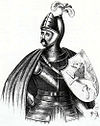 | 1328 Son of Magnus I and Sophia of Brandenburg-Stendal | 1369 – 25 July 1373 | Principality of Wolfenbüttel (with Principality of Lüneburg) | Katherine of Anhalt-Bernburg 1327 eight children | 25 July 1373 Leveste aged 44-45 | Inherited Wolfenbüttel from his father. However, the Lüneburg War of Succession allowed his succession also in this duchy. However, the War of Succession brought, after his death, the dukes of Saxe-Wittenberg to the government. |
| After the death of Magnus II with the Necklace, a treaty (the Reconciliation of Hanover) was agreed between the widow of Magnus II and her sons and the claimers, Albert of Saxe-Wittenberg and his uncle Duke Wenceslaus I of Saxe-Wittenberg: the estates of the Principality were to pay homage both to the Welfs and to the Ascanians, and the two noble houses would govern the state alternately. Initially, the land would be given to the two Ascanians from Wittenberg, and after their death it would go to the sons of the fallen Duke Magnus II. After their death, rule of the Principality was to revert to the Ascanians. In order to underpin the agreement, in 1374 Albert of Saxe-Lüneburg married Catharina, the widow of Magnus II. The treaty also envisaged the creation of a statutory body representing the estates, which was to supervise the treaty. However, 1373–1388 would be the only period in which a Brunswick-Luneburg land was not ruled by a Welf:
In the wake of his death, Elector Wenceslas appointed Bernard, his brother-in-law, as co-regent involved him in the government. But his younger brother Henry did not agree with this ruling, and after vain attempts to reach an agreement, the fight flared up again in the spring of 1388. Elector Wenceslas had to assemble an army without the help of Bernard, supported by the town of Lüneburg. From Winsen an der Aller, he wanted to attack Celle, which was held by Henry and his mother. During the preparations Elector Wenceslas fell seriously ill and died shortly thereafter. According to legend, he was poisoned. Lüneburg continued the preparations, formed an alliance with the Bishop of Minden and Count of Schaumburg and set up his own army. On 28 May 1388, battle was joined at Winsen an der Aller; it ended in victory for Henry. According to the provisions of the Treaty of Hanover from the year 1373, after the death of Wensceslas, the Principality passed to the House of Welf. In 1389, an inheritance agreement between the Welfs and the Ascanians was concluded, the treaty of 1374 was abolished, and the Principality was secured for the Welfs. | |||||||
| Frederick I | 1357 First son of Magnus II nad Catherine of Anhalt-Bernburg | 25 July 1373 – 5 June 1400 | Principality of Wolfenbüttel | Anna of Saxe-Wittenberg 1386 two children | 5 June 1400 Kleinenglis aged 42-43 | Children of Magnus II. As the eldest, Frederick inherited Wolfenbuttel alone, while his younger brothers held Luneburg sinceits recovery in 1388. After Frederick I's childless death in 1400, the remaining brothers exchanged feuds until 1428. | |
| Henry (I) the Mild | 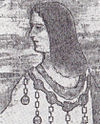 | 1355 Second son of Magnus II nad Catherine of Anhalt-Bernburg | 15 May 1388 – 14 October 1416 | Principality of Lüneburg | Sophia of Pomerania 11 November 1388 two children Margaret of Hesse 30 January 1409 Kassel one child | 14 October 1416 aged 60-61 | |
| 5 June 1400 – 1409 | Principality of Wolfenbüttel | ||||||
| Bernard I |  | 1358 Third son of Magnus II nad Catherine of Anhalt-Bernburg | 15 May 1388 – 1409 1428 – 11 June 1434 | Principality of Lüneburg | Margaret of Saxe-Wittenberg 1386 three children | 11 June 1434 Celle aged 75-76 | |
| 1409 – 1428 | Principality of Wolfenbüttel | ||||||
| Regency of Frederick I, Duke of Brunswick-Osterode (1383–1401) | |||||||
| Eric I the Winner | c. 1380 Son of Albert I and Agnes of Brunswick-Lüneburg | 1383 – 28 May 1427 | Principality of Grubenhagen | Elisabeth of Brunswick-Göttingen six children | 28 May 1427 aged 46-47 | ||
| Otto (III) the One-Eyed | 1380 Son of Otto (II) and Margarethe of Jülich-Berg | 13 November 1394 – 6 February 1463 | Principality of Göttingen | Agnes of Hesse 1408 one child | 6 February 1463 Uslar aged 82-83 | With no male heirs, after his death Göttingen is absorbed by Calenberg. | |
| Göttingen annexed to Calenberg | |||||||
| William (III & I) the Victorious |  | 1392 Son of Henry (I) and Sophia of Pomerania | 14 October 1416 – 1428 | Principality of Lüneburg | Cecilia of Brandenburg 30 May/6 June 1423 Berlin two children Matilda of Holstein-Pinneberg 1466 one child | 25 July 1482 aged 89-90 | Sons of Henry the Mild, ruled jointly. In 1428 they exchanged, with their uncle Bernard I, Lüneburg for Wolfenbüttel. In 1432 founded the Principality of Calenberg, a split-off from Lüneburg, and left the remaining Wolfenbüttel to his brother Henry IV. After the latter's death William took his lands. In 1463, attached the Principality of Göttingen to Calenberg. In 1473, William also annexed Wolfenbüttel. |
| 1428 – 1432 | Principality of Wolfenbüttel | ||||||
| 1432 – 25 July 1482 | Principality of Calenberg (with Principalities of Göttingen from 1463 and Wolfenbüttel from 1473) | ||||||
| Henry (II) the Peaceful | 1411 Son of Henry (I) and Margaret of Hesse | 14 October 1416 – 1428 | Principality of Lüneburg | Helena of Clèves 1436 one child | 7 December 1473 aged 61-62 | ||
| 1428 – 7 December 1473 | Principality of Wolfenbüttel | ||||||
| Wolfenbüttel briefly annexed to Calenberg | |||||||
| Otto II | 1396 Son of Frederick I and Adelaide of Anhalt-Bernburg | 4 May 1421 – 1452 | Principality of Grubenhagen (at Osterode) | Schonetta of Nassau-Weilburg (d.1436) 1414 one child | 1452 | After his death, Osterode returned to Grubenhagen. | |
| Osterode re-merged in Grubenhagen | |||||||
| Regency of Otto II, Duke of Brunswick-Osterode (1427–1440) | Sons of Eric I, were under regency until 1440, when they divided Grubenhagen. Henry kept Heldenburg Castle, and Albert Herzberg Castle, but kept the joint rule at Osterode am Harz and Einbeck. Ernest didn't participate in the division, and abdicated in 1464, to become a canon in Halberstadt. | ||||||
| Henry III | 1416 Grubenhagen First son of Eric I and Elisabeth of Brunswick-Göttingen | 28 May 1427 – 20 December 1464 | Principality of Grubenhagen (at Heldenburg from 1440) | Margaret of Żagań before 27 June 1457 two children | 20 December 1464 aged 47-48 | ||
| Ernest II | 1418 Second son of Eric I and Elisabeth of Brunswick-Göttingen | 28 May 1427 – 1466 | Principality of Grubenhagen | Unmarried | 1466 aged 47-48 | ||
| Albert II | 1 November 1419 Third son of Eric I and Elisabeth of Brunswick-Göttingen | 28 May 1427 – 15 August 1485 | Principality of Grubenhagen (at Herzberg) | Elisabeth of Waldeck 15 October 1471 two children | 15 August 1485 aged 65 | ||
| Otto IV the Lame |  | c.1400 First son of Bernard I and Margaret of Saxe-Wittenberg | 11 June 1434 – 1 June 1446 | Principality of Lüneburg | Elisabeth of Eberstein 1425 one child | 1 June 1446 aged 45-46 | Ruled jointly. Their rule was marked by major building work to Celle Castle and also by numerous reforms which improved the legal situation of farmers vis-a-vis their local lords. Frederick abdicated to his sons and went to a monastery, but after the death of his son Otto, he left the monastery and resumed his rule. |
| Frederick II the Pious |  | 1418 Second son of Bernard I and Margaret of Saxe-Wittenberg | 11 June 1434 – 1457 9 January 1471 – 19 March 1478 | Magdalene of Brandenburg 3 July 1429 Tangermünde three children | 19 March 1478 Celle aged 59-60 | ||
| Bernard II | 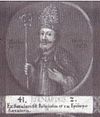 | 1437 First son of Frederick II and Magdalene of Brandenburg | 1457 – 9 February 1464 | Principality of Lüneburg | Matilda of Holstein-Pinneberg 1463 no children | 9 February 1464 Celle aged 26-27 | Children of Frederick II, ruled jointly. Bernard was also Prince-Bishop of Hildesheim. |
| Otto V the Magnanimous |  | 1439 First son of Frederick II and Magdalene of Brandenburg | 1457 – 9 January 1471 | Anne of Nassau-Siegen 25 September 1467 Celle two children | 9 January 1471 Celle aged 31-32 | ||
| Regency of Albert II, Duke of Brunswick-Grubenhagen (1464–1479) | With his uncle Albert, officialized the division of Grubenhagen. However, his death without descendants allowed his cousins (sons of Albert) to reunite Grubenhagen. | ||||||
| Henry IV | 1460 Son of Henry III and Margaret of Żagań | 20 December 1464 – 6 December 1526 | Principality of Grubenhagen (at Heldenburg) | Elisabeth of Saxe-Lauenburg 26 August 1494 Einbeck no children | 6 December 1526 Einbeck aged 65-66 | ||
| Regency of Anne of Nassau-Siegen (1478–1486) | Son of Otto V. As he opposed to the newly elected Emperor Charles V, the latter deposed him from the duchy and gave it to his sons. | ||||||
| Henry (III) the Middle | 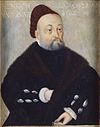 | 15 September 1468 Lüneburg Son of Otto V and Anne of Nassau-Siegen | 19 March 1478 – 1520 | Principality of Lüneburg | Margaret of Saxony 27 February 1487 Celle seven children Anna von Campe c. 1528? (morganatic) no children | 19 February 1532 Wienhausen aged 63 | |
| Frederick III the Turbulent | 1424 First son of William (III & I) and Cecilia of Brandenburg | 25 July 1482 – 1485 | Principality of Calenberg (at Calenberg proper) | Anna of Brunswick-Grubenhagen-Einbeck After 1460 no children Margaret of Rietberg 10 May 1483 no children | 5 March 1495 Hann. Münden aged 70-71 | Children of William III/I, divided their inheritance. Wiliam IV/II imprisoned by his brother Frederick, and took his place in Calenberg, reuniting the inheritance once again. William eventually abdicated of all his property to his sons. | |
| William (IV & II) the Younger |  | 1425 Second son of William (III & I)] and Cecilia of Brandenburg | 25 July 1482 – 1495 | Principality of Calenberg (at Wolfenbüttel until 1485; at Principality of Göttingen only since 1491) | Elizabeth of Stolberg-Wernigerode 1444 three children | 7 July 1503 Hardegsen aged 77-78 | |
| Regency of Henry IV, Duke of Brunswick-Grubenhagen and Elisabeth of Waldeck (1485-1490) | In 1526 reunited Grubenhagen under his hands. | ||||||
| Philip I | 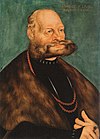 | 1476 Son of Albert II and Elisabeth of Waldeck | 15 August 1485 – 4 September 1551 | Grubenhagen (at Herzberg; from 1526 in all Grubenhagen) | Unknown before 1509 one child Catherine of Outer Mansfeld c. 1510? nine children | 4 September 1551 Herzberg am Harz aged 74-75 | |
| Henry (IV) the Elder | 14 June 1463 First son of William (IV & II) and Elisabeth of Stolberg-Wernigerode | 1495 – 23 June 1514 | Principality of Wolfenbüttel | Catherine of Pomerania-Wolgast 1486 nine children | 23 June 1514 Leer aged 51 | Children of William IV/II, initially ruled jointly, but in 1494, they officially divided their inheritance. | |
| Eric I the Elder |  | 16 February 1470 Neustadt am Rübenberge Second son of William (IV & II) and Elisabeth of Stolberg-Wernigerode | 1495 – 30 July 1540 | Principality of Calenberg | Katharina of Saxony 1496/97 no children Elisabeth of Brandenburg 7 July 1525 Stettin four children | 30 July 1540 Haguenau aged 70 | |
| Henry (V) the Younger |  | 10 November 1489 Wolfenbüttel Son of Henry (IV) and Catherine of Pomerania-Wolgast | 23 June 1514 – 11 June 1568 | Principality of Wolfenbüttel | Maria of Württemberg 1515 eight children Sophia of Poland 22/25 February 1556 no children | 11 June 1568 Wolfenbüttel aged 78 | He was the last Catholic of his family. Under him the medieval fortress (Burg) was rebuilt into a castle (Schloss); he was a passionate opponent of the Lutherans, and driving force behind the Catholic alliance established against the Schmalkaldic League; the disinheritance of a third son could not be carried out. |
| Otto (VI & I) |  | 24 August 1495 Celle First son of Henry (III) and Margaret of Saxony | 1520 – 11 August 1549 | Principality of Lüneburg (at Harburg from 1527) | Meta von Campe 1527 (morganatic)no children | 11 August 1549 Harburg aged 53 | Sons of Henry VII, ruled jointly. Otto abdicated in 1527 and founded his own estate, the Lordship of Harburg, which passed to his own descendants. Ernest was a champion of the Protestant cause during the early years of the Protestant Reformation. Francis started his co-rulership in 1536, and abdicated three years later to rule in his own estate, the Principality of Gifhorn, which was reannexed to Lüneburg after his death as he left no descendants. |
| Ernest I the Confessor |  | 27 June 1497 Uelzen Second son of Henry (III) and Margaret of Saxony | 1520 – 11 January 1546 | Principality of Lüneburg | Sophia of Mecklenburg-Schwerin 2 June 1528 Schwerin seven children | 11 January 1546 Celle aged 48 | |
| Francis |  | 23 November 1508 Uelzen Third son of Henry (III) and Margaret of Saxony | 1520 – 23 November 1549 | Principality of Lüneburg (at Duchy of Gifhorn from 1539) | Clara of Saxe-Lauenburg 29 September 1547 Amt Neuhaus seven children | 23 November 1549 Gifhorn aged 41 | |
| Gifhorn re-merged in Lüneburg | |||||||
| Regencies of Elisabeth of Brandenburg and Philip I, Landgrave of Hesse (1540–1545) | During his regency, his mother implemented the Reformation in Calenberg. She also wrote a "government manual" for Eric, with important advice that should serve him as a guide. Left no descendants, and Calenberg was annexed to Wolfenbüttel. | ||||||
| Eric II the Younger |  | 10 August 1528 Dassel Son of Eric I and Elisabeth of Brandenburg | 30 July 1540 – 17 November 1584 | Principality of Calenberg | Sidonie of Saxony 17 May 1545 Hann. Münden no children Dorothea of Lorraine 26 November 1575 Nancy no children | 17 November 1584 Pavia aged 56 | |
| Calenberg annexed to Wolfenbüttel | |||||||
| Council of Regency (1546–1555) | Left no descendants. The land passed to his brothers. | ||||||
| Francis Otto |  | 20 June 1530 Celle First son of Ernest I and Sophia of Mecklenburg-Schwerin | 11 January 1546 – 29 April 1559 | Principality of Lüneburg | Elisabeth Magdalene of Brandenburg 5 February 1559 no children | 29 April 1559 Celle aged 28 | |
| Otto II the Famous | 25 September 1528 Celle Son of Otto (VI & I) and Meta von Campe | 11 August 1549 – 26 October 1603 | Principality of Lüneburg (at Harburg) | Margaret of Schwarzburg-Leutenberg 8 September 1551 four children Hedwig of East Frisia 8 October 1562 twelve children | 26 October 1603 Harburg aged 75 | ||
| Ernest III |  | 17 December 1518 Osterode am Harz First son of Philip I and Catherine of Outer Mansfeld | 4 September 1551 – 2 April 1567 | Grubenhagen | Margaret of Pomerania-Wolgast 9 October 1547 Wolgast one child | 2 April 1567 Herzberg am Harz aged 48 | Left no male descendants. The land passed to his brother Wolfgang. |
| Henry (VI) | 4 June 1533 Lüchow-Dannenberg Third son of Ernest I and Sophia of Mecklenburg-Schwerin | 29 April 1559 – 19 January 1598 | Principality of Lüneburg (from 1569 in Dannenberg) | Ursula of Saxe-Lauenburg 1569 seven children | 19 January 1598 Dannenberg aged 64 | Brothers of Francis Otto, initially ruled jointly. In 1569, Henry founded the duchy of Dannenberg, which left to his own descendants. William ruled alone from 1569. | |
| William V the Young | 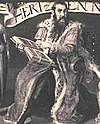 | 4 July 1535 Fourth son of Ernest I and Sophia of Mecklenburg-Schwerin | 29 April 1559 – 20 August 1592 | Principality of Lüneburg | Dorothea of Denmark 12 October 1561 fifteen children | 20 August 1592 aged 57 | |
| Wolfgang | 6 April 1531 Herzberg am Harz Fifth son of Philip I and Catherine of Outer Mansfeld | 2 April 1567 – 14 May 1595 | Principality of Grubenhagen | Dorothea of Saxe-Lauenburg 10 December 1570 Osterode am Harz no children | 14 May 1595 Herzberg am Harz aged 64 | Like most of his predecessors, he had financial problems, so he was often forced to sell or pledge major parts of his possession and he had to demand high taxes. As he left no male descendants, the land passed to his brother Philip. | |
| Julius |  | 29 June 1528 Wolfenbüttel Son of Henry (V) and Maria of Württemberg | 11 June 1568 – 3 May 1589 | Principality of Wolfenbüttel | Hedwig of Brandenburg 25 February 1560 Cölln eleven children | 3 May 1589 Wolfenbüttel aged | In 1584 Julius absorbed the Principality of Calenberg. By embracing the Protestant Reformation, establishing the University of Helmstedt, and introducing a series of administrative reforms, Julius was one of the most important Brunswick dukes in the early modern era. |
| Ernest II | 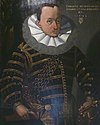 | 31 December 1564 CelleFirst son of William V and Dorothea of Denmark | 20 August 1592 – 2 March 1611 | Principality of Lüneburg | Unmarried | 2 March 1611 Celle aged 46 | Left no descendants. The land passed to his brother, Christian. |
| Henry Julius |  | 15 October 1564 Hessen Son of Julius and Hedwig of Brandenburg | 3 May 1589 – 30 July 1613 | Principality of Wolfenbüttel | Dorothea of Saxony 26 September 1585 Wolfenbüttel one child Elizabeth of Denmark 19 April 1590 Cölln ten children | 30 July 1613 Prague aged 48 | In 1596 occupied Grubenhagen. |
| Philip II | 2 May 1533 Sixth son of Philip I and Catherine of Outer Mansfeld | 14 May 1595 – 4 April 1596 | Principality of Grubenhagen | Clara of Brunswick-Wolfenbüttel 1 July 1560 Wolfenbüttel no children | 4 April 1596 aged 62 | As he left no male descendants, the land had no heir and was occupied by the Principality of Wolfenbüttel. | |
| Grubenhagen annexed to Wolfenbüttel, and then definitely to Lüneburg | |||||||
| Julius Ernest | 11 March 1571 Lüchow-Dannenberg Son of Henry (VI) and Ursula of Saxe-Lauenburg | 19 January 1598 – 26 October 1636 | Principality of Lüneburg (at Dannenberg) | Maria of East Frisia 1 September 1614 two children Sybille of Brunswick-Lüneburg 1616 two children | 26 October 1636 aged 65 | Left no descendants. The short-lived Dannenberg principality reverted to Lüneburg. | |
| Dannenberg annexed to Lüneburg | |||||||
| William Augustus |  | 15 March 1564 Harburg First son of Otto II and Hedwig of East Frisia | 26 October 1603 – 30 March 1642 | Principality of Lüneburg (in Harburg) | Unmarried | 30 March 1642 Harburg aged 78 | Sons of Otto II, ruled together in Harburg. After William Augustus' death, the lordship reunited with Lüneburg. |
| Christopher | 21 August 1570 Harburg Fourth son of Otto II and Hedwig of East Frisia | 26 October 1603 – 7 July 1606 | Elisabeth of Brunswick-Wolfenbüttel 28 October 1604 Harburg no children | 7 July 1606 Harburg aged 35 | |||
| Otto III |  | 20 March 1572 Harburg Fifth son of Otto II and Hedwig of East Frisia | 26 October 1603 – 4 August 1641 | Hedwig of Brunswick-Wolfenbüttel 14 April 1621 Wolfenbüttel no children | 4 August 1641 Harburg aged 69 | ||
| Harburg re-merged in Lüneburg | |||||||
| Christian the Elder |  | 9 November 1566 Celle Second son of William V and Dorothea of Denmark | 2 March 1611 – 8 November 1633 | Principality of Lüneburg (with Grubenhagen from 1617) | Unmarried | 8 November 1633 Celle aged 66 | Absorbed Grubenhagen from Wolfenbüttel. As he left no descendants, the land passed to his brother, Augustus. Grubenhagen is definitively annexed to Lüneburg. |
| Regency of Elizabeth of Denmark (1616–1622) | Children of Henry Julius. Frederick Ulirch inheriteed the major duchy, and Sophie Hedwig a seat at Spiegelberg. Because of his alcoholism, Frederick Ulrich was deposed by his own mother, with the help of her brother, Christian IV of Denmark. She took the regency in his name. During her regency, Elizabeth lost in 1617 the Principality of Grubenhagen and left the government business for Anton von Streithorst, who nearly ruined the state by minting coins from cheap metals and thus causing inflation. Because of the bad situation of the state, the king of Denmark had Frederick take control of the government again. Frederick didn't leave descendants, and his lands passed to collateral lines of the Lüneburg Welfs. | ||||||
| Frederick Ulrich |  | 5 April 1591 Wolfenbüttel Son of Henry Julius and Elizabeth of Denmark | 1613 – 11 August 1634 | Principality of Wolfenbüttel | Anna Sophia of Brandenburg 4 September 1614 Wolfenbüttel no children | 11 August 1634 Braunschweig aged 43 | |
| Sophia Hedwig |  | 13 June 1592 Wolfenbüttel Daughter of Henry Julius and Elizabeth of Denmark | 1613 – 13 January 1642 | Principality of Wolfenbüttel (at Spiegelberg) | Ernest Casimir I, Count of Nassau-Dietz 8 June 1607 Dillenburg two children | 13 January 1642 Arnhem aged 49 | |
| Augustus the Elder |  | 18 November 1568 Celle Third son of William V and Dorothea of Denmark | 8 November 1633 – 1 October 1636 | Principality of Lüneburg | Unmarried | 1 October 1636 Celle aged 67 | No legitimate issue. The land passed to his brother, Frederick IV. |
| Augustus the Younger |  | 10 April 1579 Dannenberg | 11 August 1634 – 17 September 1666 | Principality of Wolfenbüttel | Clara Maria of Pomerania-Barth 13 December 1607 Strelitz two children Dorothea of Anhalt-Zerbst 26 October 1623 Zerbst five children Elisabeth Sophie of Mecklenburg 1635 two children | 17 September 1666 Wolfenbüttel aged 87 | Younger son of Henry (VI). Inherited Wolfenbüttel from his cousin Frederick Ulrich, who had left no descendants. In 1643 he moved into the Residence at Wolfenbüttel, was the founder of a barock theatre and the Bibliotheca Augusta. |
| George | 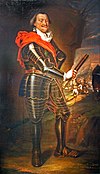 | 17 February 1582 Celle Sixth son of William V and Dorothea of Denmark | 11 August 1634 – 2 April 1641 | Principality of Calenberg | Anne Eleonore of Hesse-Darmstadt 14 December 1617 Darmstadt eight children | 2 April 1641 Hildesheim aged 59 | Inherited Calenberg from his cousin Frederick Ulrich, who had left no descendants. Abdicated to his son in 1641. |
| Frederick IV |  | 28 August 1574 Celle Fourth son of William V and Dorothea of Denmark | 1 October 1636 – 10 December 1648 | Principality of Lüneburg | Unmarried | 10 December 1648 Celle aged 74 | As he left no descendants, the land passed to a nephew, Christian Louis, son of Frederick's brother George. |
| Christian Louis | 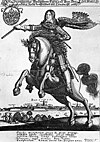 | 25 February 1622 Herzberg Castle First son of George and Anne Eleonore of Hesse-Darmstadt | 1641 – 10 December 1648 | Principality of Calenberg | Sophia Dorothea of Schleswig-Holstein-Sonderburg-Glücksburg 9 October 1653 no children | 15 March 1665 Celle aged 43 | In 1648 inherited the Principality of Lüneburg from his uncle Frederick IV, he gave Calenberg to his younger brother George William, and instead ruled the larger territory of Lüneburg. |
| 10 December 1648 – 15 March 1665 | Principality of Lüneburg | ||||||
| George William |  | 26 January 1624 Herzberg Castle Second son of George and Anne Eleonore of Hesse-Darmstadt | 10 December 1648 – 15 March 1665 | Principality of Calenberg | Éléonore Desmier d'Olbreuse 1676 one child | 28 August 1705 Wienhausen aged 81 | When his brother, Christian Louis died childless in 1665, George William inherited Luneburg. He then gave Calenberg to his next brother, John Frederick. At his death without male descendants, the land passed to his son-in-law, the Elector of Hanover. Lüneburg is annexed to Hanover. |
| 15 March 1665 – 28 August 1705 | Principality of Lüneburg | ||||||
| Lüneburg definitely annexed to Hanôver | |||||||
| Rudolf Augustus |  | 16 May 1627 Hitzacker Second son of Augustus and Dorothea of Anhalt-Zerbst | 17 September 1666 – 26 January 1704 | Principality of Wolfenbüttel | Christiane Elizabeth of Barby-Mühlingen 1650 three children Rosine Elisabeth Menthe 1681 (morganatic) no children | 26 January 1704 Kissenbrück aged 76 | Sons of Augustus the Younger, the eldest two ruled jointly from 1685 to 1702. The youngest, Ferdinand Albert, ruled from the town of Bevern. According to reports dating to 1677, Rudolf Augustus slashed a way through the Lechlum Forest, the Alten Weg ("Old Way"), later the "Barock Road" between the Lustschloss of Antoinettenruh via the little barock castle [later the Sternhaus] to the Großes Weghaus at Stöckheim; in 1671 captured the town and fortress of Brunswick. After the death of Rudolf Augustus, Anthony Ulrich returned to the throne and ruled alone. A politician, art lover and poet, he founded a museum named after him in Brunswick; he had also Salzdahlum Castle built. |
| Anthony Ulrich |  | 4 October 1633 Third son of Augustus and Dorothea of Anhalt-Zerbst | 18 April 1685 – 27 March 1714 | Elizabeth Juliana of Schleswig-Holstein-Sønderburg-Nordborg 17 August 1656 thirteen children | 27 March 1714 Salzdahlum aged 80 | ||
| Ferdinand Albert I |  | 22 May 1636 Braunschweig Son of Augustus and Elisabeth Sophie of Mecklenburg | 17 September 1666 – 23 April 1687 | Principality of Wolfenbüttel (at Bevern) | Christine of Hesse-Eschwege 25 November 1667 Eschwege six children | 23 April 1687 Bevern aged 50 | |
| John Frederick |  | 25 April 1625 Herzberg Castle Third son of George and Anne Eleonore of Hesse-Darmstadt | 1665 – 18 December 1679 | Principality of Calenberg | Benedicta Henrietta of the Palatinate 30 November 1668 Hanover three children | 18 December 1679 Augsburg aged 54 | As he left no male heirs, the land passed to his younger brother, Ernest Augustus. |
| Ernest Augustus I |  | 20 November 1629 Herzberg Castle Fourth son of George and Anne Eleonore of Hesse-Darmstadt | 18 December 1679 – 23 January 1698 | Principality of Calenberg (until 1692) Electorate of Hanover (from 1692) | Sophia of the Palatinate 30 September 1658 Heidelberg seven children | 23 January 1698 Herrenhausen Palace aged 68 | In 1692, he was appointed Prince-elector by Leopold I, Holy Roman Emperor, thus raising the House of Welf to electoral dignity. The old Principality of Calenberg thus adopted the new name of Electorate of Hanover. |
| George I Louis | 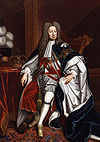 | 28 May 1660 Hanover Son of Ernest Augustus I and Sophia of the Palatinate | 23 January 1698 – 11 June 1727 | Electorate of Hanover | Sophia Dorothea of Brunswick-Lüneburg 22 November 1682 Celle (annulled 1694) two children | 11 June 1727 Osnabrück aged 67 | The electorship became effective under his rule. In 1705 reunited his father-in-law's princedom of Lüneburg to the Electorate. In 1714 was chosen for King of Great Britain, starting a personal union between Hanover and this new country. Lüneburg was definitely annexed to the Electorate. Thus the Wolfenbüttel was the remaining old land of Brunswick-Lüneburg that remained separate. |
| Augustus William |  | 8 March 1662 Wolfenbüttel Son of Anton Ulrich and Elisabeth Juliana of Schleswig-Holstein-Sonderburg-Norburg | 27 March 1714 – 23 March 1731 | Principality of Wolfenbüttel | Christine Sophie of Brunswick-Wolfenbüttel 1681 no children Sophie Amalie of Holstein-Gottorp 1695 no children Elisabeth Sophie Marie of Schleswig-Holstein-Sonderborg-Norburg 1710 no children | 23 March 1731 Wolfenbüttel aged 69 | Ruler of the only land that was still not in Hanoverian lands, to which it would never belong. |
| George II Augustus |  | 30 October/9 November 1683O.S./N.S. Herrenhausen Palace Son of George I Louis and Sophia Dorothea of Brunswick-Lüneburg | 11 June 1727 – 25 October 1760 | Electorate of Hanover | Wilhelmina Charlotte Caroline of Brandenburg-Ansbach 22 August / 2 September 1705O.S./N.S. Hanover ten children | 25 October 1760 Kensington Palace, London aged 76 | In personal union with Great Britain. |
| Louis Rudolph |  | 22 July 1671 Wolfenbüttel Son of | 23 March 1731 – 1 March 1735 | Principality of Wolfenbüttel | Christine Louise of Oettingen-Oettingen 22 April 1690 Aurich three children | 1 March 1735 Braunschweig aged 63 | Left no male heirs, and his land passed to a collateral line. |
| Ferdinand Albert II | 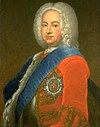 | 29 May 1680 Bevern Son of Ferdinand Albert I and Christina Wilhelmina of Hesse-Eschwege | 23 April 1687 – 2 September 1735 1 March – 2 September 1735 | Principality of Wolfenbüttel (at Bevern until March 1735) Principality of Wolfenbüttel (at Wolfenbüttel proper from March 1735) | Antoinette Amalie of Brunswick-Wolfenbüttel 15 October 1712 Braunschweig thirteen children | 2 September 1735 Salzdahlum aged 55 | Grandson of Augustus II, and from a collateral line of Brunswick-Bevern the family), succeeded in 1735. He was married to the daughter of the previous ruler. |
| Charles I |  | 1 August 1713 Braunschweig Son of Ferdinand Albert II and Antoinette Amalie of Brunswick-Wolfenbüttel | 2 September 1735 – 26 March 1780 | Principality of Wolfenbüttel | Philippine Charlotte of Prussia 2 June 1733 Berlin thirteen children | 26 March 1780 Braunschweig aged 66 | Founder of the Collegium Carolinum in Brunswick, the porcelain makers of Fürstenberg, the fire office; in 1753 the Residence was moved to Brunswick. |
| George III William Frederick |  | 4 June 1738 Norfolk House, London Son of Frederick, Prince of Wales and Augusta of Saxe-Gotha | 25 October 1760 – 29 January 1820 | Electorate of Hanover (until 1814) Kingdom of Hanover (from 1814) | Charlotte of Mecklenburg-Strelitz 8 September 1761 London fifteen children | 29 January 1820 Windsor Castle, Berkshire aged 81 | In personal union with Great Britain. |
| Regency of Prince George of the United Kingdom (1811–1820) | |||||||
| Charles II William Ferdinand | 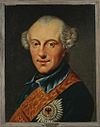 | 9 October 1735 Wolfenbüttel Son of Charles I and Philippine Charlotte of Prussia | 26 March 1780 – 10 November 1806 | Principality of Wolfenbüttel | Augusta of Great Britain 16 January 1764 London seven children | 10 November 1806 Ottensen aged 71 | Due to financial problems, was obliged to replace his father. He was the head of the Prussian Army; died in the Battle of Jena; because his son and heir died young, and two other sons were not eligible, rule passed to his youngest son. |
| With the dissolution of the Holy Roman Empire in 1806, the title of Duke of Brunswick-Lüneburg ceased to exist. However, its successor states continued. | |||||||
| Frederick William the Black Duke |  | 9 October 1771 Braunschweig Son of Charles II William Ferdinand and Augusta of Great Britain | 16 October 1806 – 8 July 1807 1813 – 16 June 1815 | Principality of Wolfenbüttel (until 1807) Duchy of Brunswick (from 1813) | Marie Elisabeth Wilhelmine of Baden 1 November 1802 Karlsruhe three children | 16 June 1815 Quatre Bras aged 43 | Duke of Oels/Silesia, the "Black Duke"; recruited a Freikorps (volunteer corps), the Black Brunswickers, at the outbreak of the War of the Fifth Coalition in Bohemia in 1809, and made his way via Brunswick to the North Sea and then on to Great Britain. |
| On the Eve of Napoleonic era, in 1807 the Duchy was briefly annexed to the Kingdom of France, to appear again in 1813 as Duchy of Brunswick. | |||||||
| Regency of Prince George of the United Kingdom (1815–1823) | On the eve of the July Revolution of 1830, Charles was in Paris, and did not manage to keep the duchy for himself; his brother William took over with the agreement of the people and his international neighbours. | ||||||
| Charles II |  | 30 October 1804 Braunschweig First son of Frederick William and Marie of Baden | 16 June 1815 – 9 September 1830 | Duchy of Brunswick | Unmarried | 18 August 1873 Geneva aged 68 | |
| George IV Augustus Frederick | 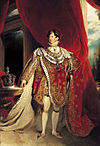 | 12 August 1762 St James's Palace, London First son of George III William Frederick and Charlotte of Mecklenburg-Strelitz | 29 January 1820 – 26 June 1830 | Kingdom of Hanover | Caroline Amelia Elizabeth of Brunswick-Wolfenbüttel 8 April 1795 London one child | 26 June 1830 Windsor Castle, Berkshire aged 67 | In personal union with the United Kingdom. Named regent of his father due to his illness, succeeding him after his death in 1820. Left no male descendants. The Kingdom passed to his brother. |
| William IV Henry |  | 21 August 1765 Buckingham House, London Third son of George III William Frederick and Charlotte of Mecklenburg-Strelitz | 9 September 1830 – 20 June 1837 | Kingdom of Hanover | Adelaide of Saxe-Meiningen 13 July 1818 London four children | 20 June 1837 Windsor Castle, Berkshire aged 71 | In personal union with the United Kingdom. Usually numbered IV as King of Hanover and the United Kingdom. As he left only illegitimate descendants, the land passed to his brother. |
| William |  | 25 April 1806 Braunschweig Second son of Frederick William and Marie of Baden | 9 September 1830 – 18 October 1884 | Duchy of Brunswick | Unmarried | 18 October 1884 Sybillenort aged 78 | |
| Victoria |  | 24 May 1819 Kensington Palace, London Daughter of Prince Edward, Duke of Kent and Strathearn and Victoria of Saxe-Coburg-Saalfeld | 20 June 1837 – 22 January 1901 | United Kingdom | Albert of Saxe-Coburg and Gotha 10 February 1840 St James's Palace nine children | 22 January 1901 Osborne House, Isle of Wight aged 81 | End of personal union with the United Kingdom, as in this country the successor in 1837 was Queen Victoria, niece of William Henry. In Hanover the Salic Law was still active. |
| Ernest Augustus |  | 5 June 1771 Buckingham House, London Fifth son of George III William Frederick and Charlotte of Mecklenburg-Strelitz | 1837 – 18 November 1851 | Kingdom of Hanover | Frederica of Mecklenburg-Strelitz 29 May 1815 Neustrelitz three children | 18 November 1851 Hanover aged 80 | |
| George V Frederick | 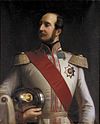 | 27 May 1819 Berlin Son of Ernest Augustus and Frederica of Mecklenburg-Strelitz | 18 November 1851 – 20 September 1866 | Kingdom of Hanover | Marie of Saxe-Altenburg 18 February 1843 Hanover three children | 12 June 1878 Paris aged 59 | He was the last king of Hanover, as his reign ended with the Unification of Germany. |
| Hanover annexed to the German Empire | |||||||
| Regency of Prince Albert of Prussia (1885–1906) Regency of Duke John Albert of Mecklenburg-Schwerin (1906–1913) | His regency came to an end on 1 November 1913 when Ernest Augustus, Crown Prince of Hanover's son, was permitted to ascend to Duchy following his marriage to Princess Victoria Louise of Prussia. In 1918, with the abolition of the monarchy, all nobles titles were equally abolished. | ||||||
| Ernest Augustus |  | 17 November 1887 Penzing Son of Ernest Augustus, Crown Prince of Hanover and Thyra of Denmark | 1 November 1913 – 8 November 1918 | Brunswick | Victoria Louise of Prussia 24 May 1913 Berlin five children | 30 January 1953 Marienburg Castle (Hanover) aged 65 | |
Family trees
[edit]Welf family tree 12th century
[edit]Welf family tree 18th century to present
[edit]Some direct ancestors (fathers and sons) of the present generation are:
- Ernest Augustus, King of Hanover (1771–1851), Duke of Cumberland and Teviotdale from 1799, king from 1837
- George V of Hanover (1819–1878)
- Ernest Augustus, Crown Prince of Hanover (1845–1923)
- Ernest Augustus, Duke of Brunswick (1887–1953)
- Ernest Augustus, Prince of Hanover (1914–1987)
- Ernest Augustus, Prince of Hanover (born 1954)
See also
[edit]References
[edit]- ^ Jones, B. (2013). Dictionary of World Biography. Canberra, Australia: Australian National University Press. p. 356. ISBN 9781922144492.
- ^ Canduci, pg. 294
- ^ Riedesel, Friedrich Adolf (1868). von Eelking, Max (ed.). Memoirs, and Letters and Journals, of Major General Riedesel During His Residence in America. Vol. 1. Translated by Stone, William L. Albany: J. Munsell. p. 29.
I remain ever, Your affectionate Charles, Duke of Brunswick and Lüneburg. Brunswick, February 14, 1776. To Colonel Riedesel.
- ^ Grubenhagen was firstly annexed to Wolfenbüttel, but in 1617 was a part of Lüneburg.
- ^ a b c d e f g h i j k The numbering of the first Henrys and Welfs follows the one established in the Historia Welforum. See Historia Welforum Weingartensis, MGH SS XXI.
- ^ Schneidmüller, Die Welfen, p. 127; Störmer, Die Welfen in der Reichspolitik, p. 261.
- ^ "Sophia von Bayern. In: Genealogie Mittelalter: Mittelalterliche Genealogie im Deutschen Reich bis zum Ende der Staufer". Retrieved 2016-04-27.
- ^ Numbered V as Count Palatine of the Rhine
- ^ Numbered VI as Count Palatine of the Rhine
- ^ As the first Duke of Brunswick-Luneburg, the numbering restarts from here.


 French
French Deutsch
Deutsch









